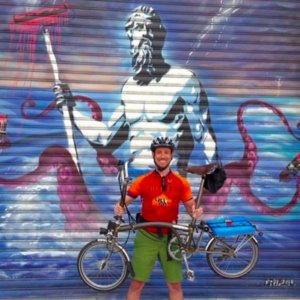CEO Will Butler-Adams outlines the growth of Brompton Bikes and why exporting is the ultimate business game-changer.
Was there always a plan to make Brompton into an export business?
It was before my time we first started exporting. Andrew (Ritchie) who invented the bike was so damned determined to get the bike off the ground, he was never really interested in exporting at all. His main passion was in making the best product. He used to find people wanting to buy his bike more of a distraction, in the early days. The product did the selling for him. It happened mostly as a result of the bikes being transportable. People could take it with them when they travel.
More recently, but still going back 12 years, we took a strategic decision to accelerate our export. We made it an important part of our business strategy.
See also: Overcoming obstacles to exporting
Why did you decide to export? Was the domestic demand slowing?
No, actually. At the time we couldn’t meet the demands of the domestic business. We didn’t like the idea that we were so reliant on one country. In the bike industry, you are quite reliant on the weather. We were eager to have more eggs in more baskets. And while we were and are the distributor in the UK, we took a decision to reduce our margins to go overseas (as distributors take a margin). We also risked upsetting our domestic customers as well.
You turn up with a Brompton and people initially think ‘what’s that funny little bike with funny little wheels?’ You need to lay the foundation before you can make any actual sales. It paid off though, because if we waited until some of these market matured, we would have been too slow.
How did you expand?
We had two markets outside the UK initially, that were there by their own volition: Benelux (Belgiun, Netherlands, Luxembourg) and Germany.

What was interesting for us was entering Asia. We approached it in a more strategic way. Before that, our journey has been one where people have approached us, saying ‘I’d like to sell your bikes in this territory.’ We’d say no, because we’re too busy.
In the early days (when choosing a distributor), Andrew would say ‘you look like a nice person, you can be my distributor.’
Later on, we did more due diligence, understood the markets a bit more, and interestingly always went for the less obvious distributors: those who were small, passionate and really got our product.
We are a big part of their business and they really care about us, and they know we’re not just a fad.
What about brand value? How important is that when exporting?
I’m not a huge fan of brand. What matters is the product, and if that’s part of the brand, then great.
We had a competitor, bikes made in America, who struggled to succeed in Asia. They frustrated customers, didn’t communicate well…it was a nightmare doing business with them! And that was an early lesson for me.
They didn’t work well with B2B customers, and it’s important to respect and work well with your distributors, especially in your early days.
We have a very very long relationship with distributors. You have to give them confidence, and they’re going to be in it for at least five years.
In the early years, no one is going to make money. It’s all about building relationships with distributors and delivering a fantastic experience to early adopter.
Has Brexit had an impact on business?
Currency has affected everything, but it’s all a load of tosh. It’s completely overrated! If I got my R&D right and deliver electric bikes, that will do well for our business.
If you think about it, we’ve had the “world’s worst recession” in years, and China’s going pear-shaped, and so on. But it’s all positive.
Ultimately, if you manage to get 7 per cent change in price, is that going to transform your business? I don’t know. If your product is right, the message is right, is 7 per cent going to make much of a difference? I’d rather focus on delivering great service for customers and my team.
Was it difficult to raise funding?
It’s never been a problem for us, because we’ve been patient. I remember I was 28 when I joined brompton. And I changed my career from working in a large corporate. Friends of mine thought it was all nuts. But compound growth is a funny thing. You look back and think, ‘flipping hell, we’ve done well.’

You choose export markets that are right for your business. In our case that meant pro forma. If you don’t have the money for our product, we aren’t making them. We grew in control, and didn’t need loans. In the early days, for the sake of our cash flow we had to be a bit more choosy.
We are making bikes, and there’s not so expensive. You just have to be patient and look for the long term opportunities.
How have local competitors reacted to your entrance into their market? Has it been friendly competition, or has it ever gotten ugly?
We’ve had a few challenges. As we’ve grown, we’ve stimulated more copies of our bikes. And that’s a challenge. The market is growing and there’s plenty of room for competition, but I get pretty naffed off when I see people copying our designs. But when I see genuinely new designs, that’s great for the industry. It’s not about getting distracted by competition. Just keep innovating, innovating, innovating.
How do you target markets?
If China’s the market for today, where do you think the market will be in five years’ time?
Growth has dropped from 7 per cent to 4 per cent, but no one really knows because statistics are really iffy.
There are over a billion people in China. If you go to Chengdu, for example, it’s as big as London, and average earning is the same as Lyon. That’s a huge opportunity.
You need to be patient, look after your service, and take a long term view. We’ve been there nearly five years, and we’re just beginning to see traction. It’ll take another five to really see growth.

The US is another great market, with over 300 million people, and metropolises with similar challenges as we have in UK. In the short to medium term, there are greater opportunities in US. In the longer term, China.
Ultimately, we are not selling to countries; we’re selling to cities. We look at people and environments who fit our product.
For example, we went to China over India because the infrastructure in Chinese cities fit our bikes. India is still on the cards, but the infrastructure is not ready for our bikes. We don’t want our customers to have to dodge cows and potholes, so we’re still a few years away from that.
Thailand, Indonesia, Malaysia, Chile, or Colombia, however, are not ever going to be strategic markets for us, so we are happy to let distributors take control of it, with light touch guidance from us.
How big is currency a concern?
Currency isn’t a big concern at all. It comes down to having trust with your distributors. When you say 250 people work for us, that’s true, but it runs far beyond what we’re doing in London.
We have an agreement if currency fluctuates more than 5 per cent, we’ll adjust prices. Nobody likes it, but it’s an option.
There are people who make it their business to manage currency, let them do that. It’s not our concern. If you’re spending too much time on currency, you’re not doing the right thing for your business.
Have you made any mistakes when exporting?
We’ve made a few. The key is to make the mistakes. To have the confidence to make mistakes is something to be proud of. Be careful not to make a mistake so big it takes the company out.
Before you spend months procrastinating and looking for advice, get out there!
Take a cheap flight, go to China for 450 quid, go walk the streets, meet people in your industry, you’ll learn.
You may learn it’s not what you thought, and it’s a waste of effort. That way, you needn’t bother. Or you’ll know the market more, and you can get back in there with the right plans.
Go have a laugh, eat some funny food, drink some funny whisky and learn. We all have our webcams and skype and all that, but it’s not a substitute.

Meet people, build relationships, trust. Now everyone is obsessed with lawyers and contracts and 50-page documents. But the key thing is trust. If it all goes pear-shaped we’ll be in court anyway.
Is it a good time to be a UK manufacturer?
The product should overrule everything. If your business relies on a third party, even if it’s the government, I’d be very concerned. If we can’t rely on our own ingenuity and product, I wouldn’t be able to sleep at night.
I find it very frustrating when I hear people say ‘the reason we’re not doing well is because the government is not helping.’ If you’re relying on others to make your business a success, that’s a problem.
The change in culture in our embassies around the world has really helped. They wouldn’t have even looked at a grubby little bike manufacturer 30 years ago, but now there’s plenty of help.
But don’t ever feel like they’re driving your success. You’re driving your success. They’re just there to make it easier.
How do you keep that culture going?
It’s so difficult. It’s all a bit of luck, really. We’re still a small company but we’re getting there. We have a strong vision, and it’s very big. We want to change the way people live in cities. We live in a preposterous world where most of us live in cities, but they’re the worst places to live.
People spend all their life in a rathole, squish together in a tube five days a week, pop out on the other end and spend hours cramped in front of a computer.
The irony of it all is the average distance to commute in London is four miles, and you can easily cycle that. It’s bonkers! And it’s the same in New York, and all other big cities. We need to rethink the way we live in cities. And that’s a big ambition. We have not even started.
Ultimately, it’s bloody good fun! If you don’t take it too seriously, it’s all about enjoying yourself and finding nice people to do business with.
Only 1 per cent of the world population live in the UK. It’s bonkers not to get out there and meet fun and interesting people. Exporting is bloody good fun.
This interview was moderated by Jeremy Cook, chief economist of currency company World First.






